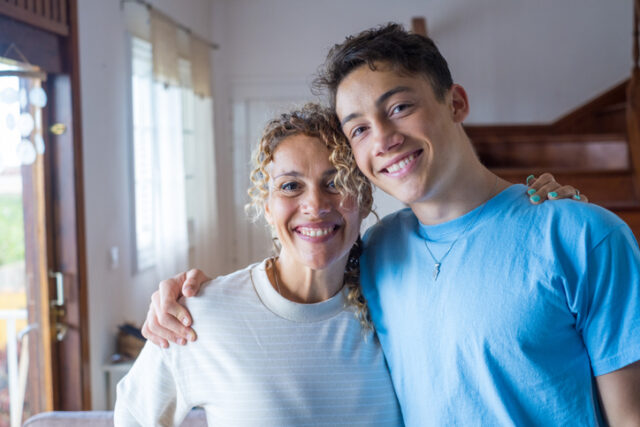Telling your child that you and their other parent are splitting up is one of the hardest conversations you’ll ever have.

They’ll likely be upset, confused, and maybe even feel insecure about what the future holds, but how you break the news to them and handle their reaction can make a major difference in how they cope with such a massive change, as well as heal from it. If you want to be sure to approach the situation with care and clarity, here are some good approaches to try.
1. Choose a calm, quiet time with no distractions.

Don’t deliver the news in a rush or between errands. Choose a time when your child is fed, rested, and has nowhere else to be. Your presence and emotional availability are just as important as the words. Turn off the TV, put away devices, and give them your full attention. Kids can sense when something big is coming, so the more grounded and present you are, the safer they’ll feel, even in hard moments.
2. Tell them together if possible.

If the situation allows, it’s best for both parents to be present when telling the child about the divorce. This shows unity in care, even if your relationship is ending. It also prevents confusion or mixed messaging. It reinforces the idea that although your marriage is changing, your role as parents remains a joint effort. If tensions are too high to sit together peacefully, agree on the same message beforehand to keep things consistent.
3. Use clear, age-appropriate language.

Kids don’t need a long explanation or legal details. They need to hear it in simple, honest terms they can understand. Words like “divorce” or “separation” may need to be defined, depending on their age. Avoid blaming language or vague metaphors. Saying “We’re getting divorced” directly is better than dancing around it. What they need most is clarity and reassurance—not more confusion.
4. Make sure they know it’s not their fault.

This might be the most important message of all. Children, especially younger ones, often internalise conflict. They might believe something they did or said caused the split. Say directly, “This isn’t because of anything you did or didn’t do.” Repeat it more than once. Let them know the decision was made by the adults, and nothing they could’ve done would’ve changed it.
5. Avoid putting blame on the other parent.

No matter how hurt or frustrated you are, resist the urge to point fingers or frame the divorce as someone’s fault. Speaking negatively about the other parent can create loyalty conflicts and emotional distress. Frame it as a decision that both adults made, even if that’s not fully true. Later, as they grow and mature, they may ask more nuanced questions, but during the early conversations, stability is more important than details.
6. Be ready for any kind of reaction.

Your children might cry, get angry, ask questions, go quiet, or act like they don’t care. There’s no one “correct” reaction. Let them feel whatever comes up without trying to control or rush their response. If they don’t react much at all, don’t assume they didn’t hear you or don’t care. Some kids need time to process; others may express their emotions days or weeks later, often in unrelated behaviour.
7. Reassure them of what’s staying the same.

In a time of uncertainty, knowing what won’t change can be deeply grounding for a kid. Whether it’s the school they’ll still attend, their bedtime routine, or which parent makes their pancakes on Saturday—these details matter. Say things like, “You’ll still see both of us,” or “We’ll always be your parents.” Highlight what they can count on. That kind of reassurance helps soften the shock and gives them a sense of security.
8. Let them ask questions (even the hard ones).

Some kids will immediately want to know what’s happening next—where they’ll live, when they’ll see each parent, whether holidays will change. Don’t shut these questions down, even if you don’t have all the answers yet. Say, “That’s a good question. We’re still working some things out, but we’ll keep you updated.” Let them feel like they’re allowed to be curious, and that the conversation is open, not closed.
9. Stick to the facts, not your feelings.

While it’s okay to show emotion, try not to turn the conversation into a therapy session about your own heartbreak. Your child is looking for steadiness, not emotional role reversal. Keep the focus on what they need to know and how it affects them. Later, you can share more honestly—when they’re older, when the dust settles, or when they specifically ask. Right now, they need containment and calm.
10. Make it clear you’ll still work as a parenting team.

Reinforce the message that divorce ends a marriage, not a family. Children worry about being caught in the middle. They need to know that both parents will still be involved and committed to their wellbeing. Say, “We may not be living together anymore, but we’re still your mum and dad. We’ll keep talking to each other and working together to take care of you.” That reminder can reduce anxiety more than you might think.
11. Expect repeat conversations.

This isn’t a one-and-done talk. Your child, no matter their age, will return to this topic again and again, especially during transitions or emotional moments. That doesn’t mean you said it wrong—it means they’re still processing. Stay open to future questions. Sometimes they’ll want the same reassurance. Sometimes they’ll want more detail. The goal is to keep the door open so they know it’s okay to bring it up anytime.
12. Let them express anger or sadness safely.

They may not have the language to say, “I’m grieving the loss of our family structure,” but they’ll show it in other ways. Meltdowns, irritability, or pulling away emotionally can all be part of the process. Don’t punish them for big emotions. Make space for them. Let them cry, rant, or sit in silence. You don’t need to fix their feelings—you just need to stay present and loving through them.
13. Offer stability wherever you can.

Divorce often comes with changes to schedule, home, and family rhythm. That’s why keeping other parts of life steady becomes even more important. Stick to familiar routines as much as possible. Keep dinner times predictable, honour traditions, and hold on to whatever gives their day structure. The more consistent the external world feels, the safer they’ll feel on the inside.
14. Be honest, but not overly detailed.

Children need truth, but not every truth. You can be honest without giving them the play-by-play of your relationship breakdown or the court proceedings. Focus on what they need to know now. Avoid talking about money, infidelity, or your ex’s personal flaws. Those details belong to the adult relationship, not to your child’s version of family life.
15. Invite other trusted adults to support them.

Let teachers, caregivers, or extended family know what’s going on, especially if your child is struggling emotionally or behaviourally. Having a network of safe adults can make a big difference. Sometimes kids open up to other people more easily than their parents during high-stress times. That’s not a rejection—it’s just a different outlet. Let them have it. What matters is that they’re processing somewhere.
16. Keep reminding them that they’re deeply loved.

Even if you say it once, they need to hear it again. Divorce can stir up questions about worth, security, and belonging. Children often need repeated reminders that your love for them hasn’t changed. Say it directly. Show it in small ways. Write a note in their lunchbox. Hug them more often. Let them know their place in your heart is untouched, unshaken, and absolutely permanent.




